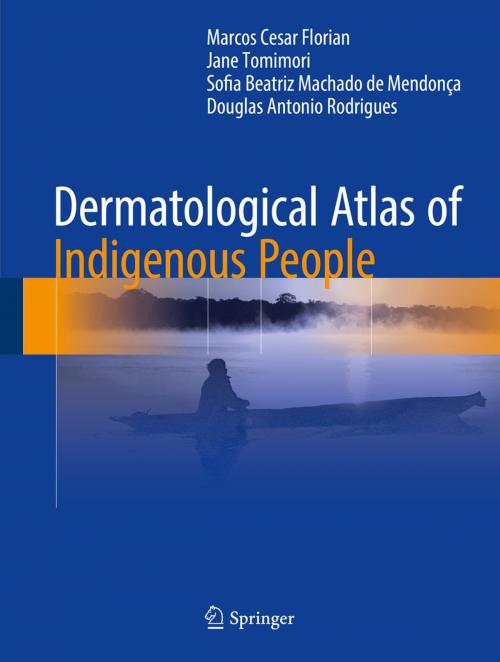Dermatological Atlas of Indigenous People
Nonfiction, Health & Well Being, Medical, Specialties, Dermatology, Reference, Public Health| Author: | Marcos Cesar Florian, Jane Tomimori, Sofia Beatriz Machado de Mendonça, Douglas Antonio Rodrigues | ISBN: | 9783319594460 |
| Publisher: | Springer International Publishing | Publication: | September 7, 2017 |
| Imprint: | Springer | Language: | English |
| Author: | Marcos Cesar Florian, Jane Tomimori, Sofia Beatriz Machado de Mendonça, Douglas Antonio Rodrigues |
| ISBN: | 9783319594460 |
| Publisher: | Springer International Publishing |
| Publication: | September 7, 2017 |
| Imprint: | Springer |
| Language: | English |
Skin diseases are highly prevalent among indigenous people, leading to low mortality but greatly impacting their quality of life. Such diseases can be observed in indigenous people; both those living in isolated communities and those who have since been urbanized to some degree share a common characteristic of presenting different clinical patterns than non-indigenous individuals. These specificities necessitate a special approach when diagnosing dermatologic diseases in indigenous people. However, these considerations are rarely discussed in standard dermatology books.
This Atlas addresses that gap by providing specific materials for professionals involved in the health of indigenous people, especially with those who live either alone or in remote areas. It offers a comprehensive overview of the most common skin diseases in specific tribes, providing a full clinical guide on the dermatologic signs and symptoms in these individuals. Additionally, the book complements the clinical standpoint with an anthropologic perspective, examining the impact of dermatologic diseases in indigenous people and the different meaning of these diseases in their lives. Most of the material presented in this Atlas was collected in the Xingu Program, a project created in 1965 by the Federal University of São Paulo, Brazil, and devoted to providing medical care to indigenous people from the Upper Xingu region, in the heart of the Amazon rainforest. Thus, the content is primarily applicable to South American indigenous people. However, the common characteristics of the isolation and non-urbanization of these communities, as well as the anthropologic perspective adopted here, allow the content to be extrapolated to other indigenous peoples worldwide. This Atlas will be a novel and valuable resource for health professionals who work with indigenous peoples, especially in geographic areas where dermatologists are not always readily available.
Skin diseases are highly prevalent among indigenous people, leading to low mortality but greatly impacting their quality of life. Such diseases can be observed in indigenous people; both those living in isolated communities and those who have since been urbanized to some degree share a common characteristic of presenting different clinical patterns than non-indigenous individuals. These specificities necessitate a special approach when diagnosing dermatologic diseases in indigenous people. However, these considerations are rarely discussed in standard dermatology books.
This Atlas addresses that gap by providing specific materials for professionals involved in the health of indigenous people, especially with those who live either alone or in remote areas. It offers a comprehensive overview of the most common skin diseases in specific tribes, providing a full clinical guide on the dermatologic signs and symptoms in these individuals. Additionally, the book complements the clinical standpoint with an anthropologic perspective, examining the impact of dermatologic diseases in indigenous people and the different meaning of these diseases in their lives. Most of the material presented in this Atlas was collected in the Xingu Program, a project created in 1965 by the Federal University of São Paulo, Brazil, and devoted to providing medical care to indigenous people from the Upper Xingu region, in the heart of the Amazon rainforest. Thus, the content is primarily applicable to South American indigenous people. However, the common characteristics of the isolation and non-urbanization of these communities, as well as the anthropologic perspective adopted here, allow the content to be extrapolated to other indigenous peoples worldwide. This Atlas will be a novel and valuable resource for health professionals who work with indigenous peoples, especially in geographic areas where dermatologists are not always readily available.















